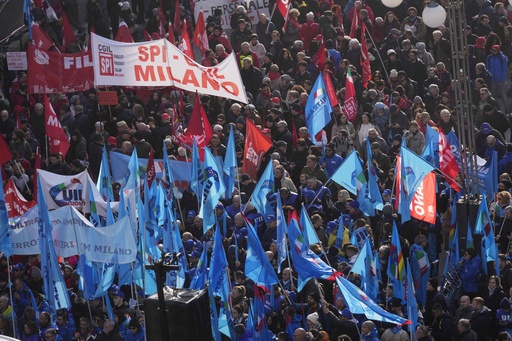
Thousands of educators, healthcare professionals, sanitation workers, and others initiated a walkout across Italy on Friday, expressing their grievances about shrinking purchasing power, persistently low wages, and governmental policies that they claim have undermined public services.
The most prominent labor unions in Italy orchestrated an eight-hour strike and organized demonstrations in various cities, targeting Prime Minister Giorgia Meloni’s recent budget. Protesters argue that this budget fails to adequately support essential services like education and healthcare. Additionally, they are advocating for a fairer allocation of profits from private enterprises to workers.
Maurizio Landini, the leader of the influential CGIL union, spoke to the media in Bologna, emphasizing that their protests extend beyond the government. “These protests don’t just speak to the government; they also address entrepreneurs, managers, and businesses that have seen unprecedented profits in recent years,” he stated.
The strike prompted ITA airlines to cancel numerous domestic and international flights, significantly impacting schools, hospitals, and public transport services. While unions called for an eight-hour strike, Transport Minister Matteo Salvini implemented a restriction that limited its duration in the transportation sector to four hours.
This marked the first general strike since November. Unions faced potential penalties for affecting the healthcare and judicial sectors, which have experienced strikes recently. Notably, the Italian railway service was excluded from these labor actions.
The healthcare sector in Italy is grappling with workforce shortages, requiring the hiring of foreign nurses, particularly in the economically disadvantaged southern regions, which lag behind the wealthier northern parts.
During the protest in Rome, Anna Salsa, a member of the UIL healthcare union, highlighted the issue: “Many professionals are leaving for better pay abroad. We are compelled to work double shifts just to meet the minimal standards of essential care.”
Participants in the demonstrations also pointed to the continuous rise in the prices of essential goods. Although there are signs that inflation may be stabilizing, the consumer advocacy group Codacons reported that grocery costs for a family of four have increased by 238 euros ($251) this year compared to last, forcing many households to cut back on purchases.
While entry-level salaries in Italy are consistent with those in other European nations, the growth in wages hasn’t kept pace. According to Maurizio Del Conte, a labor law specialist at Bocconi University in Milan, the country’s gross median salary of 35,000 euros (approximately $37,000) per year remains on the lower end of the European spectrum, particularly when compared to its G7 counterparts like France and Germany.
Del Conte pointed out that such protests typically wield greater influence when addressing center-left governments that are more inclined to collaborate with unions, contrasting with the approaches of more conservative administrations like Meloni’s far-right-led government.
